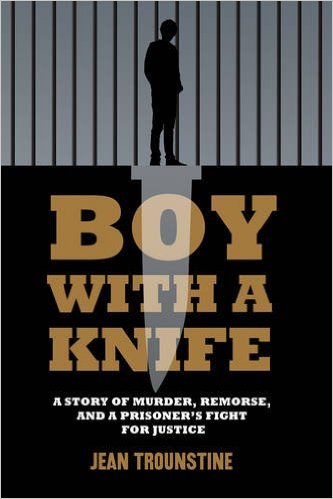 Activist, author and teacher Jean Trounstine is back to writing about prison issues with her latest, “Boy With A Knife.” Trounstine gives a detailed and extensively sourced critique of the criminal justice system by telling the story through the eyes of Karter Reed, who was convicted of second-degree murder as a 16-year-old in 1993.
Activist, author and teacher Jean Trounstine is back to writing about prison issues with her latest, “Boy With A Knife.” Trounstine gives a detailed and extensively sourced critique of the criminal justice system by telling the story through the eyes of Karter Reed, who was convicted of second-degree murder as a 16-year-old in 1993.
The point of the book is made early on: “I wondered, would these once-juvenile murderers ever get out of prison? Or would they face parole boards that felt pressured to respond to victims rights advocates who resisted paroling prisoners, and to the communities who wanted no part in their return? And: Would these prisoners ultimately end up living behind bars for the rest of their lives, even if they had not been sentenced to life without parole? What would it meant to take on a system that insisted on keeping young people locked up in spite of personal transformation?”
Reed's circumstances leading up to the crime were far from ideal. His father had been sent to prison for two decades on a drug-related charge two years earlier and his mother was drinking too much. The family lived in near-poverty in what the FBI had deemed “the most violent city in New England.” Reed was bullied and had been jumped a number of times, leading him to begin carrying a knife to school.
After vowing to protect a vulnerable friend of his, Reed instead froze and watched two other teenagers beat him up. Later that day he found himself in the classroom of a neighboring school with two other friends confronting the attackers from earlier in the day. After freezing up again in the middle of a melee, he made an impulsive decision and a boy ended up dead. Trounstine's description of the incident is simultaneously pulse-pounding, intense and heartbreaking.
The author goes on to describe Reed's path through the criminal justice system, with a major takeaway being how much outside factors can affect those inside that system. For instance, there was hysteria over youth crime taking place at the time of the incident.
“'Kids who kill' would be all over the news in the 1990s, terrifying the country into believing that a 'tidal wave of crime' was on the horizon,” Trounstine writes. “While this horrifying and racially coded message would ultimately be proven wrong, it would cause 44 states, including Massachusetts and the District of Columbia, to change their laws, making it easier to try juveniles as adults.” And Reed would indeed be tried as an adult.
Trounstine settles into a pattern in her writing — first telling a part of Reed's story that includes a problem with the system, then citing statistics supporting the presence of that problem, then (often) offering solutions. It's not an ineffective pattern either, and it helps when she adds tidbits here and there that will make your heart sink, many that go back to Reed's relationship with his father.
On Reed's first day in prison, someone passes a note to him that says, “Bash the first motherfucker who even looks at you the wrong way with a mop wringer, and don't stop till the cops pull you off. You'll go to the hole for six months or so but people will respect you.” The author of that note? His father, who somehow got the message to him from another prison. Another is when Reed mentions that one of the happiest times in his life was when he celebrated his birthday in prison with his father.
Your opinion of Reed (and possibly the book) will probably be affected by your views on the death penalty, because at the end of the day there's still a family out there who will never see the victim ever again. But with “Boy With A Knife,” Trounstine clearly exposes several problems with the American criminal justice system using a sympathetic test case.